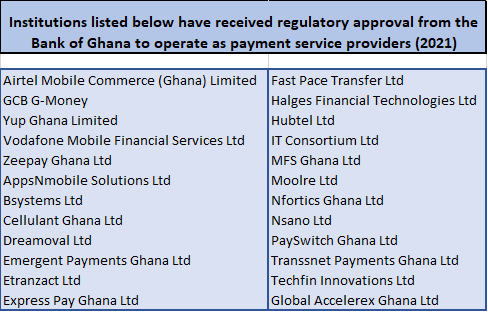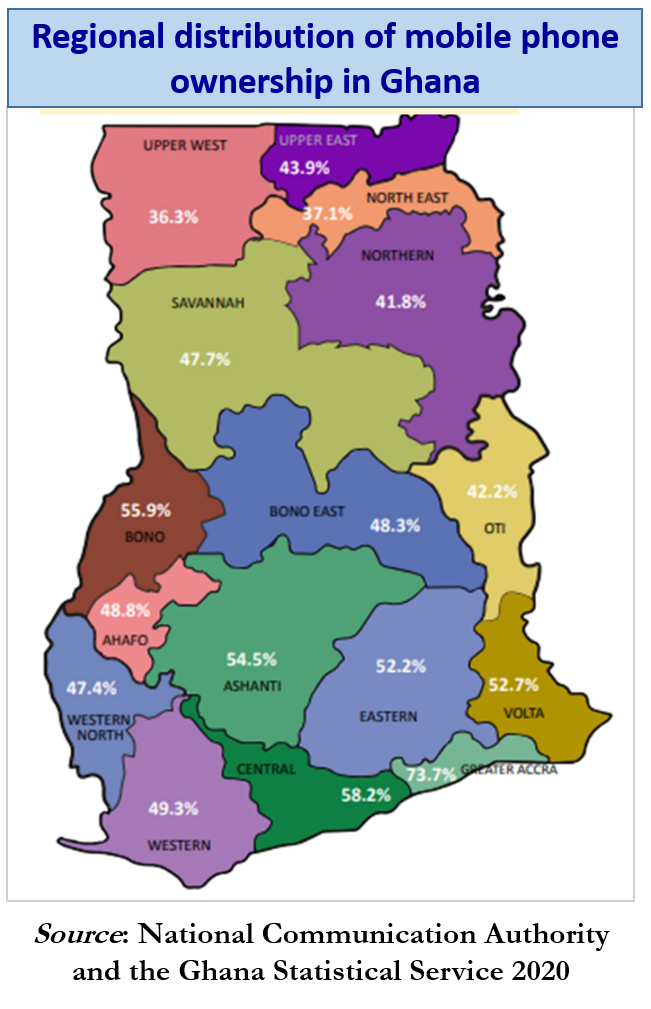Financing and developing a digital infrastructure
Yaa Ama, Accra, Ghana
January 30, 2024
G hana is accelerating the digitalization of its economy and public services. The government is using digital onboarding in public health insurance, tax registration, and personal identification. Hospitals use digital platforms to build medical records and also to monitor their patients. In the private sector, companies use digital platforms for marketing, after-sales services and payments. Ghana ranked third in Africa for private digital platforms in 2023, behind Nigeria and South Africa1. In 2024, the Bank of Ghana reported a 20 percent increase in the adoption of digital payments and use of deliveries service.2.
Digitalization is gaining ground in key economic sectors. For example, internet-based applications are transforming urban transportation in major cities. In the entertainment industry, the growing markets are gaming (video games and gambling), video and movies on-demand and music streaming. An increase in the adoption of mobile phone communication and internet use is driving this change. However, Ghana remains a cash economy despite a robust investment by the public and private sectors. Digital divides between rural and urban areas, within regions and between gender persist. The major obstacles to digitalization are the high cost and reliability of the internet and electricity outages.
Public investments
Over the past two decades, public investments in the digital infrastructure have increased by over 30 percent. In November 2008, Parliament approved a US$30 million concessionary loan facility from China for the construction of a nationwide e-Government infrastructure. In 2012, the Government of Denmark provided US$38 million for the installation of 800-kilometer fiber optic cable. The Eastern region was the principal beneficiary of this Danish-funded project.
The government founded the Ghana Infrastructure Investment Fund (GIIF) in 2014 as a permanent investment vehicle with US$325 million startup capital. The GIIF provides equity and acts as a catalyst to leverage private sector investments into infrastructure assets in Ghana. Today, the GIIF dedicates 12 percent of its portfolio to the digital industry. In the same move, in 2022, the World Bank approved US$200 million to help the Government of Ghana increase access to internet broadband. The goal of this project is to enhance the efficiency and quality of selected digital public services and to strengthen the digital innovation ecosystem.
Special projects
❶ Ghana Post digital address
In 2016, Afrifanom Limited, a private IT company and the State of Ghana, developed an application that maps and registers home addresses. Today, the platform is known as GhanaPostGPS. It has a cunning resemble to the online application Google Maps. GhanaPostGPS goal is to ensure an accurate localization of properties across the national territory. The government added the national digital address system to the GhanaPostGPS in 2017.
The system ascribes a permanent digital address to locations, landmarks and properties through the Global Positioning System (GPS) and is accessible via the GhanaPostGPS online application. It divides the country into grids of 5m x 5m squares and assigns each one a unique address, known as a digital address.
Every property gets a permanent digital address. Individual and business can download the application to generate their geo-localizable unique address. GhanaPostGPS also teamed up with the public utility company, the Electricity Company of Ghana (ECG), to generate accurate additional addresses for the households from postpaid customer bills. A technology ecosystem is emerging around the GhanaPostGPS platform. Since 2017, a wave startup technology companies have been using GhanaPostGPS property database to launch various online services.
❷e-payment projects
The Bank of Ghana is spearheading the e-Cedi (a state-backed digital currency) to spur digital payment. This digital currency will serve as an alternative to physical cash. Other initiatives are emerging in the e-payment arena. The Ghana Ports and Harbors Authority are developing a new e-payment platform for the services they offer. Similarly, the Registrar-General’s Department has launched an online business registration and payment. Another platforms handle the activities of the Ghana Revenue Authority (“GRA”), the public pension service, and the Land Registry.

❸ The Integrated Customs Management System (ICUMS)
The Integrated Customs Management System (ICUMS) became operational in 2019. This system handles the digital processing of cross-border trades on one platform without the need to switch between different systems. It also links border stations to Togo, Côte d’Ivoire, and Burkina Faso, where the degree of automated processing declarations varies depending on the access to the communications networks.
❹ Rural Telephony and Digital Inclusion Project
On November 16th, 2020 Ghana and Chinese telecom giant Ghana, Huawei unveil Euro 155 million rural connectivity project. The project targeted 30 percent of Ghana’s population, which live in rural areas with little or no access to IT and communications services. Exim Bank of China provided a credit facility to finance this telephony extension project. MTN and Ericsson subsequently joined the initiative after the Ghana Infrastructure Investment Fund (GIIF) contributed US$12 million
Private sector investment
The private sector is catching up with similar projects. Since its entry into the Ghanaian telecom markets in 2010, US company, American Tower has built over 4,200 telecom towers and other wireless infrastructure in Ghana. Since 2011, Vodafone Ghana has mobilized over US$115 million to improve internet services for businesses in Ghana. CSquared, a Google initiative, has since its creation in 2011, built over 1,070 km of metro fiber in Greater Accra, Tema, and Kumasi for an estimated cost of US$25 million.

In 2022, the African Infrastructure Investment Managers (AIIM) invested US$45 million in a private data center called “The Onix Data Centre” or ODC. The ODC offers a secure and uninterrupted data storage and backup service during maintenance, planned or unplanned disruptions.
MTN has pledged an investment of US$1 billion over the next five years, after resolving a tax dispute with the government on February 15th, 2023. Perhaps as part of this commitment, on March 31st 2023, MTN Ghana announced the construction of a US$25 Million ICT Hub in Accra. This is a partnership with the Ministry of Communication and Digitalization. The hub will create 200,000 digital jobs. After the acquisition of 70 percent stake3 in Vodafone Ghana, Telecel Group, the new majority shareholder, announced plans to invest US$500 million. This investment will spread over three years (2022-2025) to expand Vodafone’s network across the country.
Related Articles
BIBLIOGRAPHY
1❩ World Bank (2019): Ghana digital economy diagnostic
2❩ Bank of Ghana (2022): e-Cedi design - https://www.bog.gov.gh/wp-content/uploads/2022/03/eCedi-Design-Paper.pdf
3❩ The remaining 30 percent of the business will remain under the ownership of the state, which approved the sale.
